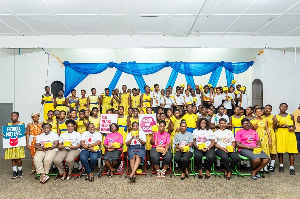 The event saw the participation of 300 students and some health personnel
The event saw the participation of 300 students and some health personnel
Regrettably, discussions around menstruation are still shrouded in secrecy due to social norms, religious beliefs, and related myths. This phenomenon can be attributed to many factors, including lack or inadequacy of knowledge, myths or beliefs, and misconceptions about menstruation.
It is for this reason that calls have been intensified for the need to increase awareness and education on menstrual hygiene.
Girls Shall Grow, a non-governmental organization headquartered in Obuasi, has been at the forefront of campaigns to sensitize young girls on the need to maintain personal hygiene and also correct certain misconceptions about menstruation.
Speaking at a symposium organized by Girls Shall Grow and the SRC Women's Commission of KNUST-Obuasi campus to mark 2024 World Menstrual Hygiene Day, the Executive Director of Girls Shall Grow, Louisa Amoah, bemoaned the level of stigmatization and misconceptions associated with menstruation.
She said menstruation is a natural process experienced by all adolescent girls and hence should not be treated as taboo.
She encouraged the girls to be confident and speak out against all forms of maltreatment encountered during menstruation.
The symposium brought together about 300 students from the KNUST-Obuasi campus, Junior High and Senior High schools in Obuasi, as well as health personnel, to share their opinions on how to maintain menstrual hygiene.
Menstrual health is a fundamental aspect of human rights, dignity, and public health. Menstrual Hygiene Day, observed annually on May 28, is dedicated to breaking taboos and raising awareness about the importance of good menstrual hygiene management.
Speaking to the media on the sidelines of the program, Louisa Amoah said the theme for this year's celebration, "Together for a period-friendly world," was spot on, stressing that it's about time issues of menstruation being made an open subject for all to discuss.
"We realize that there is a whole hostile environment making it very difficult for girls to freely talk about menstruation and their experiences, so we are seizing opportunities like this to sensitize the girls to freely speak out while advising the public to make it easier for issues of menstruation to be discussed," she said.
Dr. (Med) Enyonam Kwawukume, the Obuasi East District Health Director who was the resource person, took participants through the four phases of the menstrual cycle. This, she said, includes menstruation, the follicular phase, ovulation, and the luteal phase.
She said common menstrual problems encountered by women during menstruation are heavy or painful periods and premenstrual syndrome (PMS).
She advised the girls to be careful during the menstrual cycle since the chances of getting pregnant always increase at that stage.
The Women's Commissioner of KNUST-Obuasi campus, Claudia Owusu Amoh, said the need for girls to maintain good hygiene during menstruation was what necessitated their collaboration with Girls Shall Grow for the program.
She, however, appealed to the government to intervene by making sanitary pads accessible to girls in school.
"Now the cost factor in getting sanitary pads has become a challenge for parents. While the government looks at bringing the cost down, I am suggesting that the government can give out free sanitary pads to schoolgirls just as we do for books and uniforms," she said.
A student of Boete L/A JHS 'B', Etilda Banoba, recounted the ordeal her mother goes through periodically to get sanitary pads for her.
She said the cost of sanitary pads has made it difficult for her to maintain proper hygiene during that period of the month.
"It hasn’t been easy since I started menstruating. The price of the pads is very high, so getting sanitary pads and food at the same time is something difficult for my mother to do. This is really a challenge for most of us," she said.
She appealed to the government and other benevolent institutions to volunteer sanitary pads for girls, especially those in schools. This, she said, can prevent frequent absenteeism in schools.












